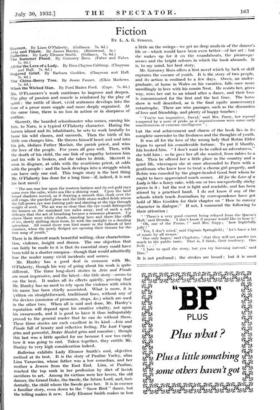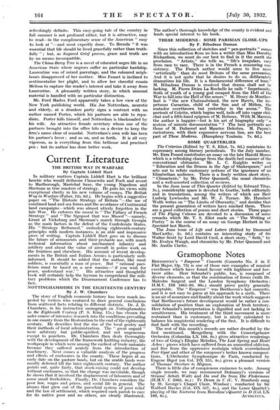Fiction
BY L. A. G. Smaxn.
7s. 6d.) 7s. 6d.)
All for the Love of a Lady. By Dion Clayton Calthrop. (Chapman and Hall. 7s. 6d.) When the Wicked Man. By Ford Madox Ford. (Cape. 7s. 6d.) Ma. O'FLAHERTY'S work continues to improve and deepen. The play of passion and muscle is reinforced by the play of spirit : the rattle of short, vivid sentences develops into the tone of a prose more supple and more deeply organized. At the same time, there is no loss in action or in sharpness of outline.
Skerrett, the bearded schoolmaster who comes, cursing his fate, to Nara, is a typical O'Flaherty character. Hating the barren island and its inhabitants, he sets to work brutally to tame his wild classes, and succeeds. Then the birth of his little son changes him. He throws himself heart and soul into his job, idolizes Father Moclair, the parish priest, and wins the love of the people. For years all goes well. Then, with the death of his child, the one link of sympathy between him and his wife is broken, and she takes to drink. Skerrett is soon in disgrace, at odds with the avaricious priest, at odds with the people : and the book develops into a struggle which can have only one end. This tragic story is the best thing Mr. O'Flaherty has done for a long time—if, indeed, it is not his best novel : " The sun was low upon the western horizon and its red-gold rays came over the calm, white sea like a shining road. Upon the land broad shadows moved, as if drawing a smooth thin cloak over the still crags, the parched glens and the little stone-walled fields where the full-grown rye was turning pale and slanting at the tips through weight of seed. The air was so clear that the eye could distinguish the houses on the mainland ten miles away, and of such a soft delicacy that the act of breathing became a sensuous pleasure. Up above there were white clouds, standing here and there like cliffs of ice, slowly shifting their form, lit with the sunlight to a dazzling splendour. All round there was bird music in the funnel% of late summer, when the newly fledged are opening their throats for the first song of youth."
There is in Skerrett much beautiful writing, clear characteriza- tion, violence, insight and 'drama. The one objection that can fairly be made to it is that its essential story could have been told in a shorter compass—though that would admittedly lose the read& many vivid incidents and scenes.
Mr. Hanley" has a good deal in common with Mr. O'Flaherty, though his way of going about his work is quite different. The three long-short stories in Aria and Finale are most impressive, and the latest—the title story—seems to me the best. It makes all its effects quietly, proving that Mr. Hanley has no need to rely upon the violence with which his name has been chiefly associated. What is more, it is Tritten on straightforward, traditional lines, without any of the devices (omission of pronouns, stops, &c.) which are used in the other two. When all is said and done, Mr. Hanley's reputation will depend upon his creative vitality, not upon his swearwords, and it is good to have it thus indisputably proved to the general reader that he can do without them. These three stories are each excellent in its kind—Aria and Finale full of beauty and reflective feeling, The Last Voyage grim and powerful, Stoker Hasleit grim and macabre ; though this last was a little spoiled for me because I saw too early how it was going to end. Taken together, they entitle Mr. Hanley to very high consideration indeed.
Ballerina exhibits Lady Eleanor Smith's cool, objective method at its best. It is the story of Pauline Varley, alias Lina Varsovina, whose father was a low comedian, and her mother a Jewess from the East End. Lina, or Pauline, reached the top rank in her profession by dint of lavish sacrifiees to art. Among its victims were her lovers, the old dancer, the Grand Duke, the Swede, the future Lord, and, inci- dentally, the child whom the Swede gave her. It is in essence a familiar story, even down to the " Snow Bird " dance, but the telling makes it new. Lady Eleanor Smith makes us lose a little on the swings—we get no deep analysis of the dancer's life or—which would have been even better—of her art : but she makes up for it on the roundabouts, the picaresqu:: scenes and the bright colours in which the book abounds. It is, to my mind, her best story.
Mr. Goronwy Rees offers a first novel which by luck or skill captures the essence of youth. It is the story of two people, and its action is confined to a few days. Owen, an under- graduate, at home in Wales on his vacation, falls once more unwillingly in love with his cousin Nest. He resists her, gives way, rows her out to an island after a dance, and their love is consummated for the first and the last time. The horse show is well described, as is the final (quite unnecessary) catastrophe. There are wise passages, such as the discussion of love and friendship, and plenty of happy touches :
"'You're too inquisitive, David,' said Mrs. Parry, her reproof tempered by a note of pride, as if inquisitiveness were some early manifestation of extreme intelligence " ;
but the real achievement and charm of the book lies in di complete surrender to the freshness and the thoughts of youth.
It was all for the love of the wrong lady that Robin Elder began to spend his considerable fortune. To put it bluntly, Ida hooked him. " I don't want to be called an adventuress," she told him : so he gave her all she wanted, from rubies to a flat. Then he offered her a little place in the country and a quiet life, whereupon she at once absconded to Paris with a gentleman who knew how to treat a chorus girl properly, and Robin was consoled by the ginger-headed Good Sort whom he ought to have appreciated much sooner. All for the Love of a Lady is like a fancy cake, with one or two unexpectedly sticky pieces in it ; but the rest is light and readable, and has been stirred by a practised hand. I do not know if any of the schools which teach Journalism by correspondence have got hold of Miss Goolden for their chapter on " How to convey character in dialogue." If not, I commend the following to their attention : " ' There's a very good concert being relayed from the Queen's Hall,' said Brenda. ' I don't know if anyone would like to hoar it.' Oh, one of the Proms. Y ' said Mrs. Gapp ; ' how frightfully jolly ! '
Yes, I don't mind,' said Captain Springfield ; let's have a bit of music by all means.' One only hopes,' said Charlotte, ' that they will not pander too much to the public taste. That is, I think, their tendency. One feels I hate to spoil the story, but you try listening instead,' said Dan."
It is not profound ; the strokes are broad : but it is most refreshingly definite. This easy-going tale of the country in full summer is not profound either, but it is attractive, easy to read—in the complimentary sense of the American " easy to look at "—and most expertly done. To Brenda " it was essential that life should be lived gracefully rather than truth- fully " ; but, as Sugared Grief proves, grace and truth are by no means incompatible.
The China-Berry Tree is a novel of educated negro life in an American State where negroes suffer no particular hardship. Laurentine was of mixed parentage, and the coloured neigh- bours disapproved of her mother. Miss Fauset is inclined to sentimentalize her plight, and to allow her cheerful cousin Melissa to capture the reader's interest and take it away from Laurentine. A pleasantly written story, in which unusual material is handled with no particular distinction.
Mr. Ford Madox Ford apparently takes a low view of the New York publishing world. His Joe Notterdam, neurotic and elderly, at a drunken party signs a contract with an author named Porter, which his partners are able to repu- diate. Porter kills himself, and Notterdam is blackmailed by his wife. An attractive female secretary whom one of the partners brought into the office hits on a device to keep the firm's name clear of scandal. Notterdam's own wife has been his partner's lover ; and so on, and so forth. It is all very vigorous, as is everything from this bellicose and practised pen but its author has done better work.































 Previous page
Previous page